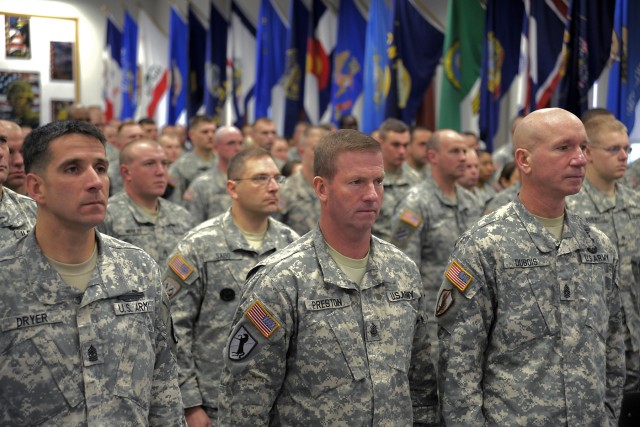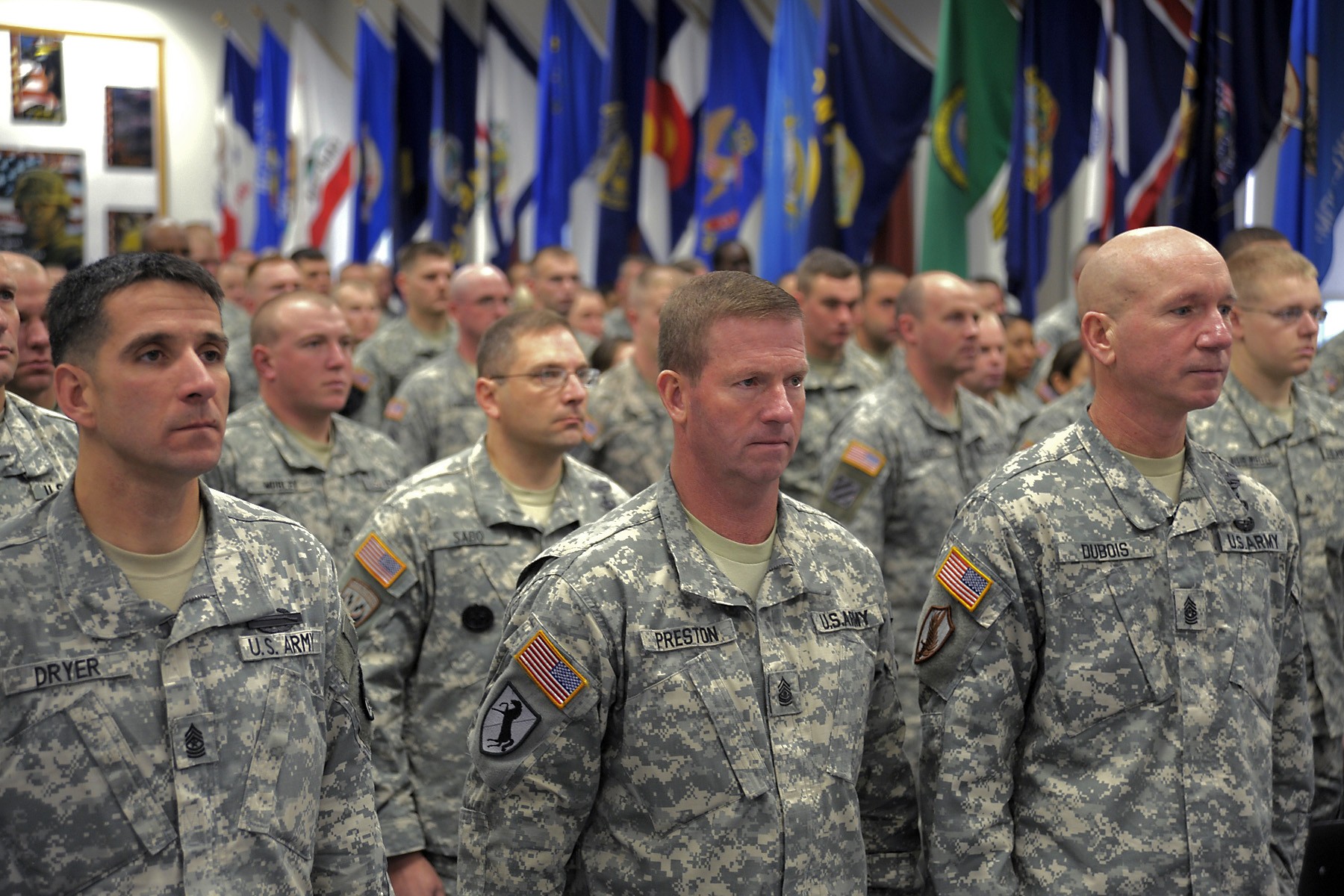
FORT McCOY, Wis. -- An appreciative audience of several hundred Warrior Leader Course graduates, Noncommissioned Officer Academy staff, Family members and friends listened to Sgt. Maj. of the Army Kenneth O. Preston talk about the future of the Army at a Nov. 19 graduation ceremony at the Staff Sgt. Todd R. Cornell NCO Academy at Fort McCoy.
Preston, the 13th sergeant major of the Army, also had the opportunity to tour the NCO Academy's WLC training site to inspect the tent setup and dining areas, said Command Sgt. Maj. M. Kevin Dubois, NCO Academy commandant.
Dubois said he approached Preston during an October Senior Reserve NCO conference in Phoenix about having him be a guest speaker at the academy. Preston's staff was able to make the visit work even with his tight schedule, which included him leaving for a previously planned overseas trip after the graduation ceremony.
As the srgeant major of the Army, Preston serves as the personal adviser to the Army chief of staff on all enlisted-related matters, particularly those affecting Soldier training and quality of life. Preston devotes the majority of his time to traveling throughout the Army observing training and talking to Soldiers and their Families.
"For all of us who have served, Families out there are our motivation," Preston told the WLC graduates. "As I look at the Army that I came into a long time ago, it was different. The attitude then was if the Army wanted you to have a Family, they would have issued you one. We've come a long, long way."
Today, 236,000 Soldiers are deployed to 80 countries, he said. A total of about 1.1 million Soldiers serve, with 568,000 active-duty troops, 362,000 Army National Guard and 206,000 Army Reserve Soldiers.
"With about 50 percent of the force in the reserve component - the Army National Guard and Reserves - we could not do today what we do without the contributions of all our citizen Soldiers," Preston said. "When you look at the Army Reserve, we have about 48,000 Army National Guard and 12,000 Reserve Soldiers currently mobilized and serving in those 80 countries."
In looking back to the events of 9/11 through the present day, the Army has been at war longer than any other era in its history, he said, and the current conditions indicate it will continue for the foreseeable future.
The basis for the conflicts have included globalization, and people using technology, such as the Internet, cell phones, satellite television, etc., to allow people who used to be isolated from world events see how others live and their quality of life. Preston said this helped increase the use of violence by state/non-state sources to accomplish political and non-political goals.
Competition for the limited, available resources also is a contributing factor to conflict and violence, he said.
Terrorist groups, which number more than 1,000, will continue to seek weapons of mass destruction and will use them if they get them, he said. The U.S. needs to keep training and taking care of its security needs.
Four roles for the U.S. Army were outlined in the most-recent Quadrennial Report, he said.
First, the Army needs to prepare to prevail in counter-insurgency campaigns, such as in Iraq or Afghanistan. Second, the Army needs to engage with other countries to carry out missions in the 80 countries where it is deployed. Third, the Army needs to prepare to participate in humanitarian relief efforts, such as for earthquake survivors of the devastation in Haiti. Fourth, the Army needs to prepare to defeat hostile states.
NCOs need to incorporate these roles into their goals and missions, he said.
Preston told the WLC graduates the most-important role they now have is to grow their Soldiers.
"You need to pass this information back to your Soldiers," he said. "Be the standard bearers, and enforce those standards when you return."
Like the Soldiers who came before them, current Soldiers need to better themselves by incorporating and learning from the lessons of their predecessors.
To become great Soldiers, they need to help establish and enforce standards to ensure things are done correctly, he said.
In his experience, Preston said any time a Soldier has been injured on duty it always could be attributed to the lack of senior leaders and NCOs enforcing standards.
"I've seen a lot of good organizations that didn't train to training standards, didn't enforce standards," he said. "When you do get mobilized, get deployed, it's too late because at that point in time (the enforcement of standards is) fragmented across the battlefield. If the NCOs down to the lowest level don't understand the standards, at that point senior leaders can't fix it."
Dubois thanked Preston for taking time out of his busy schedule to address the WLC graduates.
He presented Preston a Certificate of Appreciation and a Commandant's Coin and told him the story of the academy's namesake. Cornell, an Army Reserve Soldier from Menomonee Falls, Wis., was serving a tour of duty in Iraq when he was killed in the line of duty in 2004.
Dubois said Preston also spoke to graduates of the First Sergeant Course during a question-and-answer session the night prior to the WLC graduation. Preston answered questions the students had prepared in the week leading up to his visit and focused on the "reserve" side of training, deployment, and relevant senior NCO issues.
"I was very pleased that he (Preston) took time from his busy schedule to reinforce the "One Army" message to our students and staff," Dubois said.

Social Sharing